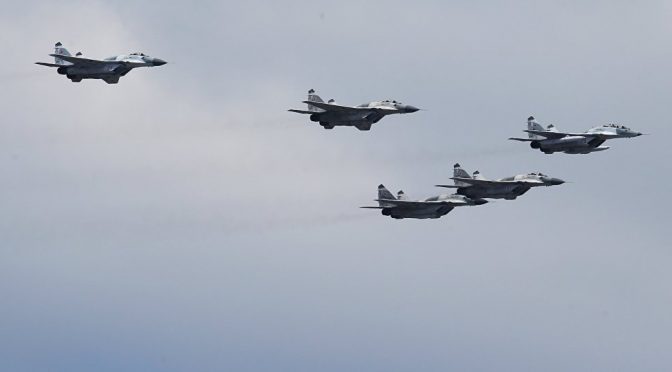There are countless of reasons why the Philippines needs to have an independent foreign policy at this point in time. Foremost of them all is the fact that until now the country hasn’t progressed economically as any other countries in the region in spite of its unquestionable loyalty to Uncle Sam.
The country is being considered by its neighbors as the weakest link in the ASEAN Community.
The holy combination of the Vatican’s intrusion into the lives of the politicians and local politics in general, with the decades of low intensity conflicts (LIC) injected by the CIA through some sectors of the armed communist movement after they were taught liberation theology by the Jesuits, and supporting of Muslim terror squads, and the strong interference of the United States State Department in the crafting of its national policies, have all retarded its march towards full industrialization which was already picking up during the last years of the Marcos dictatorship.
Most notably, the very first thing that the US did after they, i.e. White House, CIA and the Jesuits, have successfully orchestrated the fall of the late dictator Ferdinand Marcos was to prevent the switching on of the Bataan Nuclear Power Plant, which immediately resulted to several years of brownouts, and made us fully dependent on Middle East oil for decades to come.
It must be noted that we were shadowing the Japan economy before the US colonized the country.
The economy of the Philippines during the insurgency of the First Philippine Republic remained the same throughout its early years but was halted due to the break out of the Philippine–American War. Nevertheless, during the era of the First Republic, the estimated GDP per capita for the Philippines in 1900 was of $1,033.00. That made it the second richest place in all of Asia, just a little behind Japan ($1,135.00), and far ahead of China ($652.00) or India ($625.00).[36]
… When the Great Depression happened in the United States, the Philippines on the other hand wasn’t affected. Instead, the US relied on the Philippine economy throughout the depression era.
https://en.wikipedia.org/wiki/Economy_of_the_Philippines
Now, we are just a bit above the Vietnam economy. And to think that Vietnam’s economy only started to pick up decades after its patriotic war with the Americans, then perhaps the Philippines could achieve more than what it has achieved today when the US finally leave the country alone.
So, our dearest Uncle Sam, your regime change will not work in the Philippines anymore. And just like the president said, we have enough of your bullshit. Go to hell!!!
MiGs for Manila: What Happens if Moscow Starts Supplying Philippines with Arms
Sputnik
The conflict between Manila and Washington is intensifying. In a series of speeches earlier this week, President Rodrigo Duterte said that he was ready to “break up with America” and to realign his foreign policy toward other powers because the US “has failed us.”
The president also warned that if Washington refuses to sell arms to his country, he could easily turn to Russia and China.
“If you don’t want to sell arms, I’ll go to Russia.” Duterte said. “I sent the generals to Russia and Russia said ‘do not worry, we have everything you need, we’ll give it to you’…As for China, they said ‘just come over and sign and everything will be delivered’.”
The president’s latest remarks came following his announcement last month that Manila would be looking to pivot to China and Russia to counterbalance US and broader Western influence. Later this year, Duterte plans to visit both Moscow and Beijing, searching for improved economic and business relations with both powers, including Russian and Chinese investment, particularly in the aviation and telecommunications sectors.
Moscow seems to have been taken aback by Duterte’s unexpected overture. On Monday, commenting on Manila’s initiative to improve relations, Kremlin spokesman Dmitri Peskov said only that “traditionally, Russia has sought friendly, mutually beneficial and constructive relations with Washington, Beijing and Manila – in all directions.”
Geopolitical analyst and Svobodnaya Pressa columnist Sergei Aksenov was more blunt, suggesting that Duterte’s proposal is fully in line with Moscow’s strategy of promoting global multipolarity.
“The exit of Washington’s strategic ally from its absolute influence is consistent with the interests of our country,” Aksenov explained. “At the same time, it’s important to note that Duterte is not rushing from one ally to another, but looks to maintain a multi-vector policy which is first and foremost in the interests of his own country.”
Essentially, the analyst suggested, the president of the Philippines is engaged in bringing a formal end to the former US colony’s present status, including in the area of military cooperation. Earlier this week, the president pledged to end joint US-Philippines military exercises. Before that, he warned that he might ask that US to pull its troops out of the country altogether.
The Pentagon has tried to put a brave face on a bad situation. Defense Department spokesman Peter Cook responded to Duterte’s threats to kick US troops out by saying that the US “will continue to honor our alliance commitments,” adding that he “expect[s] the Philippines to do the same.” In the meantime, “we will continue to work closely with the government of the Philippines to address any concerns they may have.”
The reasons for Washington’s pussyfooting are obvious, according to Aksenov: “The loss of the Philippines would create problems for US dominance in the region, strengthening the position of China, which Washington continues to try to restrain by igniting a conflict between Manila and Beijing over disputed islands in the South China Sea.” But “now, in connection with Duterte’s new course, artificial tensions may disappear, replaced by political pragmatism.”
What’s more, Washington also has economic reasons for concern – including threats to its plans for the Trans-Pacific Partnership Agreement (TTP), which would ensure US economic supremacy in the region. In the case of the Philippines, Manila’s previous policy of supporting the agreement may change, the analyst noted.
“It’s also worth noting that Washington will have a difficult time forcing Duterte to change his plans,” Aksenov stressed, pointing to the president’s 91% ‘trust’ rating, and 76% approval three months into his presidency, which analysts have suggested is due to his tough approach to the war against narcotics.
Accordingly, in a situation where Duerte is telling Brussels to go to “purgatory,” and President Obama to “go to hell,” Russia, Aksenov says, had best take advantage of this foreign policy u-turn.
Speaking to Svobodnaya Pressa, Dmitri Kornev, — editor in chief of the news and analysis portal MilitaryRussia, suggested that that given the Philippines’ status as an island nation, Russia, as a major exporter of naval vessels, may be tapped to supply the country with fast boats, shifts and even diesel-powered subs.
Furthermore, if Manila seeks to assert itself in disputes in the South China Sea, it may turn to Russia for air defense systems, including the Buk and Tor medium and short-range SAM systems.
“As far as more modern systems, including the Vityaz and Morphei, they have yet to be introduced in our own military, so the Philippines is unlikely to get them,” Kornev explained. “More serious systems – like the S-300, won’t be delivered, because their production has been stopped; the S-400 will face the same fate in a year or two, and there is still a queue of orders for them.”
“But the supply of aircraft is possible,” Kornev added. “At one time, Russia sold MiG-29 and Su-30 aircraft to Philippines’ neighbor Malaysia. Over time, we could even supply Iskander-E, which Russia has sold only to Armenia in the past.”
For her part, Larisa Efimova, professor of Asian studies at Moscow State University, suggested that President Duterte’s foreign policy pivot was only logical, given the history of the country and his own personal background.
“Since the Philippines was a US colony for a long time, Washington pursued a policy of ‘Americanization’ of the country’s socio-political life and mentality. In part, this succeeded. They educated the intelligentsia, which comes from a culture of large landowners of Spanish influence on the one hand (Spain was the Philippines’ master for three centuries) and Chinese entrepreneurs on the other.”
“This elite ended up coming to power after the Philippines received independence. Duterte became the first ‘president of the people’, not related to the elite brought up by the US. He does not have Spanish or Chinese blood; ordinary people supported him, preferring him to the…the old elite, because he spoke in a rough and understandable language, and not in English, as his predecessors had. Moreover, as mayor of [Davao] city, he eradicated crime. Now he is spreading this experience to the rest of the country, despite protests from the West.”
Ultimately, Efimova suggested, ordinary Filipinos are no longer interested in maintaining the paternalistic relationship between their country and the US. “Duterte deliberately aggravates things, calling his opponents names in order to emphasize the country’s independence. He intends to follow further on this course. But in order to counterbalance US influence, he needs Russia. The more great powers are involved, the easier it is to maneuver between them.”
https://sputniknews.com/asia/20161007/1046103270/philippines-russian-chinese-arms-exports-commentary.html
Russia is also planning to return to Cuba and Vietnam.
Russian Defense Ministry Eyes Return to Cuba, Vietnam – Deputy Minister
Sputnik 11:18 07.10.2016(updated 12:07 07.10.2016)
MOSCOW (Sputnik) – The Russian Defense Ministry is investigating the possibility of returning to Cuba and Vietnam, State Secretary and Deputy Defense Minister Nikolay Pankov said Friday.
“We are engaged in this work,” Pankov said in the lower house of parliament, the State Duma.
Cuba hosted a Russian Foreign Intelligence Service facility until 2002, while the Cam Ranh Naval Base in southern Vietnam housed the Russian Navy until the same year.
Defense Minister Sergei Shoigu said in February 2014 that Russia may create a network of bases abroad, in countries that include Vietnam, Cuba, Venezuela, Nicaragua, the Seychelles, and Singapore.
Russia and Cuba have enjoyed close cooperation since the days of the Soviet Union. In recent years, Moscow has moved to step up ties with Havana, intensifying military-industrial cooperation, including on large-scale joint projects in the fields of energy and civil aviation.
In December 2013, Moscow wrote off most of Havana’s Soviet-era debt, estimated at about $30 billion, and denounced the US trade embargo against Cuba.
https://sputniknews.com/russia/20161007/1046088601/russia-cuba-vietnam.html
So, when Moscow starts sending MiGs to Manila, that will be the end of the US era in Southeast Asia.
When all of the above happens, and all indications are saying they will, then that will be the time when the perennial bully of the schoolyard is finally neutralized and defeated.
With a collapsing financial system, the Khazarian Nazionist are thinking that war is the only remaining option. But Russia is fully committed and is working effectively with Iran and China in defeating the US terrorist proxies in Syria.
To date, there are at least 60,000 Iran-supported fighters in Syria.
https://www.youtube.com/watch?v=CaXf90ATUK4
This on top of the covert Russian ground troops already on the ground since the war begun.
https://www.youtube.com/watch?v=Z9vfX_R8MTI
So, hold on and buckle up. A multipolar world is coming.



That would be the better and best decisions and actions that Duterte will do. A very very long Tirany and the dirty playing of Uncle Sam to the Philippines need to stop. Once this drugs abort CIA will abort too as they are the one maneuver using our elite Pilipino politicians and businessman as well. Duterte must hold a very strong decisions and should not stop whether there are negatives from the oppositions that they are trying the Duterte administration fall down for them to get yellow bring to power again and bring back drugs trading syndicate with the CIA as well.